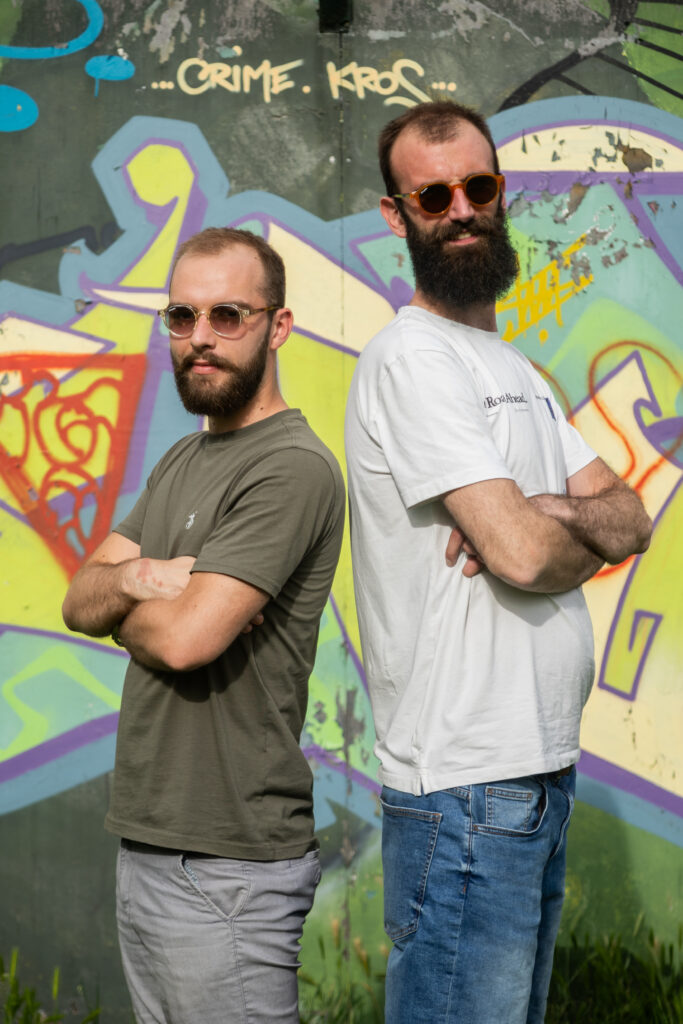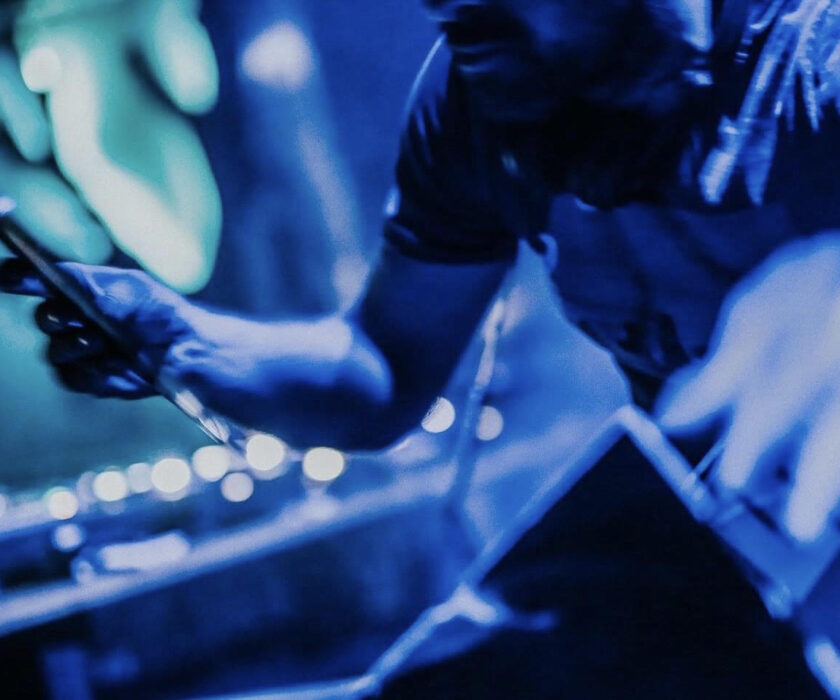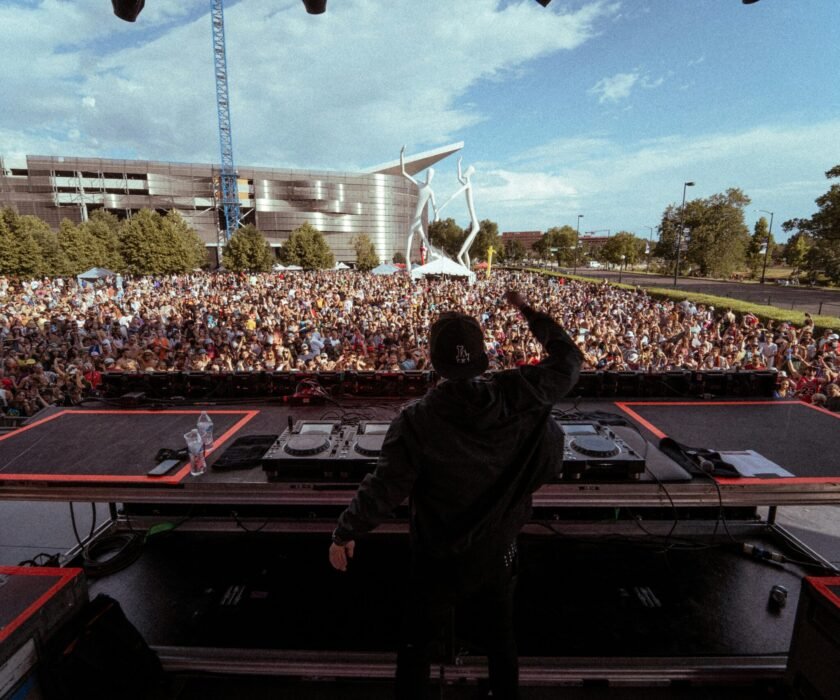The lockdown has been a challenging time for club and venue owners, but when it comes to the DJ collectives it was a flourishing period. One of the collectives formed during the pandemic was Staple, a union of three individuals, Karlo Bošnjak, Ivan Petrović and Edi Kanurić, who celebrated minimal sound.
During 2020 and 2021, ro-minimal, deep and minimal tech became popular on the capital’s scene. As there were almost no venues that were open to business, especially the late-hour ones, artists had to adjust and play on the limited number of sites. The events were mostly held in the afternoon in outdoor venues (parks and terraces), and the only option to organise an event during the night was a private party in a rented house outside of the city. Minimal and deep tech sound found its way to the outdoor parties, its BPM and vibe set the perfect atmosphere and the audience started to pay more attention to those sub-genres.
We chatted with Ivan Petrovic (Ivan P) and Karlo Bosnjak (Bosk) about the creation of Staple, its regional influence, and their future plans.

What was your motivation for creating Staple? How did you start?
Bosk: Since I started playing music before we created Staple, the whole idea came from me. When Ivan and I started to hang out 5 years ago, we discovered new music together. We bought Traktor, put it on the iron table and started to practice – those were the beginnings. Whoever really likes music has gone through that phase. I never wanted to play music to make people like me and play at all weddings and bars – I fell in love with a certain sound, from house and deep house and upgrading to new sounds as minimal to electronica. I just wanted to keep the excitement going and we started with that base. We started playing music at private parties for our crew, and it became an event we organised on Sundays called Sunday Session in Swanky Garden and Gallery. That was the beginning for me and people started to notice me and book me for other events. Soon later, in 2021, Ivan, Edi, an educated music producer, and myself decided to form Staple in the pandemic, while we were sitting on the bench in Boćarski dom (Zagreb). Unfortunately, Edi is not so involved anymore as music is not his main job – it is not easy to be a music producer in this country. The first Staple event was in October 2021 at a private venue we rented for the occasion – City Ranch.
Ivan P: I used to go out just to hang out, I would rarely actively listen to music. Before the pandemic, Zagreb had mostly techno parties and I did not pay attention to it. When Karlo and I started to hang out and go out more often, then I discovered new genres and started actively listening to the music.
Staple was practically founded during the pandemic, in the era of lockdown and police hours. How come you decided to form it then?
Bosk: We had many people around us. Our birthday parties had a minimum of 60 people, so if we sent a few texts we gathered fifty people very quickly. It actually really wasn’t for the money, we just did it to survive those crazy days. When they banned the gatherings, we hung out the most. The parties were private and weren’t official nor public, it was for familiar people. The reputation followed us during the lockdown, so when the pandemic was over we had an open door in most clubs and venues in Zagreb.
Ivan P: It was just the way we did things. We didn’t have anything to lose by forming the collective. We weren’t in a rush, we had an idea and a vision of what we wanted to achieve. Step by step, we got to the place we are standing today. For example, we wanted to create something as Cruise Split does – parties with a good sound system and a limited number of people. It’s a sense of community and closeness people feel at those kinds of events. Great music, dance and fun. At the beginning, we wanted to promote a certain minimal sound, but it changed and evolved in the past 3 years.

Staple sort of became a synonym for minimal and ro-minimal. Was that your intention and how come you chose that particular sound? Was it because of the trend, that minimal and ro-minimal became so popular on Zagreb’s scene?
Bosk: In my case, I started to explore more of that sound when I heard Senno, Sin, Marin Biocic and IGZ play music. I realised that’s the type of sound I am attracted to. I wanted to be ‘in that basket’, but not the same way. In Staple we are all similar but also completely different. Everyone likes different rhythms and builds a different story. Branko is ‘forza’, he likes dynamic sets and usually closes the night. I am somewhere in the middle while Ivan likes more ‘tender’ melodies – he has a lot to show and it’s the music that you need to listen to while he’s playing. Now I can’t say I play minimal or ro-minimal as I did in the beginning, it’s hard to define but I usually say it’s electronica. As I never wanted to play on weddings and all types of events, I can say I never wanted to be a DJ – I wanted to be an artist. Nowadays, there are not many DJs who walk around with USBs – they have Spotify. For me, the point is to spend hours digging new music and surprising the audience with it, offering something new, exciting and hard to find.
Ivan P: Minimal is not defined. Those are spheres of house, tech house, etc. For example now I play tech house but not the mainstream one you can hear on radio and most clubs, so people tend to understand it wrongly. With Staple, we wanted to bring something new and sustainable. The mathematics was always there and the numbers were important – we wanted to pay everything and not be in debts because we miscalculated.
How does Staple adjust to trends? The recent IMS report shows the rise of afro house, with house and techno being on the top. Do you feel the audience shifting?
Ivan P: We have built a community of people with similar tastes in music, but of course, it depends on the event. I think it’s important to tell your story, promote your sound and always bring something new. Trends will always be here, and people who like them will follow them, you can’t avoid that. If you have more options and events with different sounds, the variety that Zagreb has just started to get, there is a place for everyone on the scene. Also, the weather has changed a lot, and there are more possibilities to organise open-air events.
Bosk: One weekend there can be 150 people at an event – you know it’s just a ‘slower’ day and it doubles the next weekend. There are no specific rules, our scene is still not defined and formed. Also, we always watch the audience and their reactions. If I’m playing, Ivan is standing behind me and tells me if I’m doing well or if I need to turn the BPM up or down and I do the same. At the end of the day, we just want the people who come to our event to have fun. We are still at the beginning of forming a scene, but there have been some positive happenings in the past few years. Also, there are more tourists, students, and foreigners living in Zagreb. It’s getting better but we need more clubs up to 200 people – it’s important for the creation and development of subcultures.

Now there are four Staple residents as Branko Vukovic and Petar Petrović joined the collective, and Staple started to gain more popularity in the region. How come you joined forces and how is the scene in Serbia and Montenegro?
Ivan P: After Cvetko brought us to Belgrade for the first time, we noticed Petar and his sound. He brought so many amazing artists but did it as a favour to the clubs he was playing in. Branko and Petar never created a brand and we offered them to become a part of Staple. Last year we played at various events in Zagreb and Belgrade, we asked them to be our guests and we clicked. Those guys are doing a great job, and that’s how Staple became regional. Serbia is a ‘heaven’ for this type of music. They have smaller, more intimate clubs and venues where people come for that type of music. People adjust more and listen to the music. Once we did an after for psy trance event and everyone stayed, it was fascinating.
The guys will play at the afterparty for MYUZ this weekend and on the 22nd of June, Staple will have a showcase at Zagreb’s Gallery Club. We asked them for summer plans, but they still couldn’t reveal the destination – all we can say is that they are continuing to expand their brand through the region.


